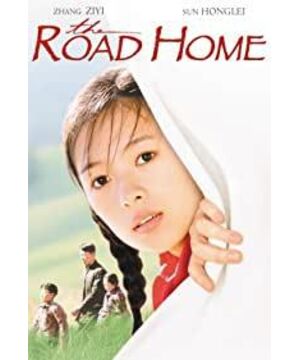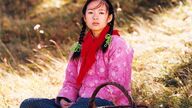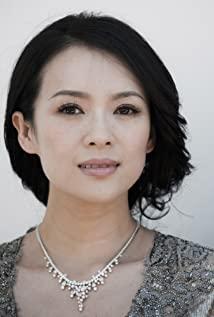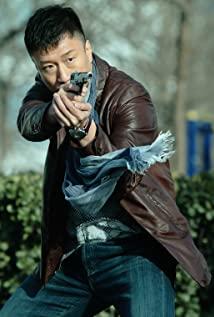"My Father and Mother" is such a Wise film that combines country and love. The film begins with a black-and-white video. As the narrator of the story, 'I', learns the sad news of his father's death, and hurries back to his hometown. As an art with dramatic characteristics, the key to film is conflict, whether it is an inner conflict or an external conflict. According to Sydfield's point of view in the book "Guide to the Creation of Film Screenwriters", generally speaking, the beginning of the film has the following functions: to explain the relationship between the main characters and their environmental era background, and to set up clues that run through the whole film. Of course, a great director can also portray part of the character's character at the beginning.
In this film, Zhang Yimou uses a monologue to point out the clues that run through the whole film: the death of his father. So the whole story revolves around the point where my father died. The story background of this film relies on the prompts of several key points, one is about 2 minutes and 50 seconds (the earliest one, and it appeared later when 'I' and my mother were talking about the loom, at 8 minutes 20), a "Titanic" poster was posted on the wall when the village chief and 'I' entered the house. I think this is probably the easiest thing to ignore if the average audience doesn't pay attention to the art of the film and just pays attention to the story itself. "Titanic" was filmed in 1997 and was released in China in 1998, and this film was released in 1999, just in time for the number. Therefore, I presume that the black and white part of the story happened in 1998. And this also points out the background of the times. In a period of rapid economic change in China, a small remote mountain village in the north staged a touching story.
The color flashback part starts from about 13:20, and the transition is realized through the winding path in an old photo, which is smooth and natural, which also reflects the ingenious idea of the editor. The colored part tells the whole process of the mother and the father who met and fell in love when they were young. This also explains from the spiritual core why the mother stubbornly carried her father back from the county seat and hurried to weave the coffin in the beginning part of the story. This is the truest expression of love. The background of the colored part can be reversed. My mother has been talking about my father’s lectures for more than 40 years, so my father and mother met in the 1950s, which can also be confirmed by my father being classified as a rightist.
The color part of the filming is very moving. Zhang Yimou has always been able to dig out those ancient techniques that have been forgotten and show them to the world, whether it is the winemaking and brides in "Red Sorghum", or the shadow play in "Alive". Some people criticized him for capturing the curiosity of audiences, especially foreign audiences, for the mysteries of the East. In my opinion, the positivity behind it may outweigh these harsh comments. Just imagine, if these things that are about to pass are not re-displayed in film language, then these memories may really be annihilated in the river of time. Not to mention that these aren't speculative show-offs, they're a key piece in moving the plot forward.
In this film, several things with oriental characteristics are explained at the same time: looms, bowls, and beams.
The loom connects the mother’s father and the school, the bowl connects the mother’s secret expression of love through cooking, and Shangliang connects the father and the school as well as the mother and the red cloth of Shangliang. These antiquated things, divorced from modern society, complete and enrich the structure of the film.
Mother and father met in this small mountain village, and the most emotional thing is the heroine's feelings of admiration, shyness or loss in front of her sweetheart. Zhang Ziyi really conveyed these emotions and impressed me the most She is wearing a bloated red cotton jacket running in the snow or among the trees on the golden hillside. I attribute this to Zhang Yimou's style of freshness, which is different from the representative things of small freshness in Taiwanese movies: guitar, Bikes, backpacks, coffee and more. Zhang Yimou's style of Xiaoqing is based on the tone of the country, whether it is this or the later "Love of the Hawthorn Tree". Of course, this can also explain that what the filmmakers express is always projecting their own experiences and the context of the times they lived in.
As the narrator, 'I' finally understood the stubbornness of his mother by reviewing the love experience of his father and mother. In contrast to the director's division of the 1998 scene into black, many of his students came to the funeral procession. It is the warmth released in human nature. Here, I dare not speculate that Zhang Yimou expresses his disappointment in reality and his nostalgia for the past through the division of black and color. But I have to admit that the cool tone represented by black and the warm tone represented by color form a certain form of reflection.
Last but not least, the film's photography, soundtrack and art are all excellent. Needless to say, the photography maintains Zhang Yimou's consistent style and use of color. The soundtrack comes from the hands of Sanbao, which has both emotional resonance and regional characteristics, and can be freely retracted. The skill of art is reflected in the scene that truly restores that simple era, whether it is the old melon at the door or the plain glaze. Large porcelain bowl.
This film uses a gentle way to talk about the imbalance of transportation and education in remote rural areas. The film is titled "My Father and Mother". The film's author praises the persistence of the fathers, but not the rural areas in the real society. The lack of sufficient concern, especially the imbalance in education, has raised concerns. Although at the end 'I' stepped onto the podium and told the students about the text that my father had written back then, achieving a certain kind of emotional reconciliation (for the sake of my father's legacy and my mother's expectations), but fundamentally, the problem It has not been resolved, 'I' still have to leave my mother to work in the county, so how should an elderly mother face the loneliness of losing her father, of course, the movie stops abruptly here. At the end, it is said that the county will send new teachers and the school will be rebuilt. However, it is still a drop in the bucket for this piece of land that has been lacking various public services for a long time, but it is better than nothing.
The film begins on that road and ends on that road. So, where should we, sitting in the cinema or in front of the screen, go to our spiritual destination?
View more about The Road Home reviews










